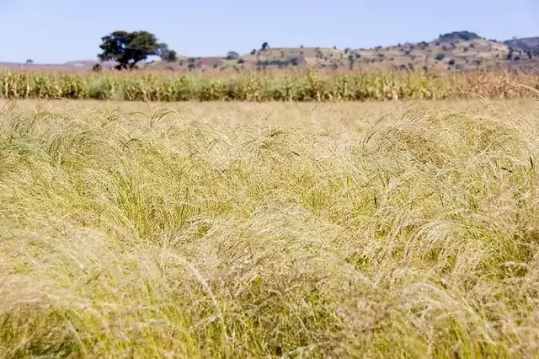#foodsecurityinAfrica
Explore tagged Tumblr posts
Text
Africa's Food Future: Transforming Agriculture Together

"Harnessing Change" at the Borlaug Dialogue
Africa's food and agribusiness sector is poised to become a powerhouse, with a projected value of $1 trillion by 2030, according to Dr. Akinwumi Adesina, President of the African Development Bank. This exciting revelation took center stage at the Norman E. Borlaug Dialogue, an annual event held in America's agricultural heartland. This year's gathering focused on the theme "Harnessing Change," where delegates and panelists explored innovative strategies to bolster innovation, adaptation, and diversification, all while fortifying resilience and sustainability in global food systems. African Leaders Rally for Food Security In a world where food security is a pressing concern, several world leaders are actively working to strengthen food production and food security across Africa. In a significant show of unity, they convened at the landmark global Feed Africa summit in Dakar, also known as the Dakar 2 Summit, last January. Unlocking Africa's Agricultural Potential Africa, home to 65% of the world's uncultivated arable land, is paradoxically a net food importer. African leaders are determined to make their countries self-sufficient and even food exporters. With the global population projected to reach nine billion by 2050, the imperative to boost agricultural productivity in Africa has never been more critical.
From Dakar 2 to Des Moines: African Development Bank's Vision
At the Borlaug Dialogue, Dr. Akinwumi Adesina took the stage to emphasize the achievements of the Dakar 2 Summit, an event organized by the African Development Bank in collaboration with the Senegalese government and the African Union. During this session titled "From Dakar 2 to Des Moines," Adesina highlighted that 34 African leaders had endorsed country-specific food and agriculture delivery compacts. These compacts outline action-driven plans aimed at ensuring food security and unlocking Africa's vast agricultural potential within five years. Empowering Millions Through the Feed Africa Strategy These compacts align closely with the core objectives of the African Development Bank's Feed Africa strategy, which was launched in 2016. Since its inception, this strategy has already positively impacted more than 250 million people by providing access to improved agricultural technologies. Investment Commitment for Food Security Adesina further disclosed that partners had committed over $70 billion to support these food compacts, with the African Development Bank pledging $10 billion over the next five years. The collective determination of African leaders at the Dakar 2 Summit underscores their commitment to ensuring the continent achieves food self-sufficiency. Ethiopia's Wheat Success President Sahle-Work Zewde of Ethiopia, who also attended the Borlaug Dialogue, celebrated Ethiopia's newfound self-sufficiency in wheat production and its ability to export wheat to neighboring countries. President Zewde pointed out that the African Development Bank's Technologies for African Agricultural Transformation (TAAT) initiative significantly contributed to this accomplishment. TAAT facilitated the distribution of over 100,000 tons of heat-tolerant wheat seeds, resulting in a remarkable 1.6 million metric ton increase in Ethiopia's wheat production in 2023. The Role of Leadership Vice President Kashim Shettima of Nigeria underscored the importance of leadership in Africa's quest to achieve food security and sustainable development. Shettima emphasized that a nation's fate hinges on the quality of its leadership. Combating Corruption and Fostering Investment Governor Caleb Mutfwang of Nigeria's Plateau State spoke about the necessity of addressing corruption and reducing administrative bottlenecks to attract investors. Mutfwang emphasized the importance of making investments in Plateau State a win-win proposition and called for streamlining the process for investors.
The African Development Bank's Commitment
The African Development Bank has already dedicated $853 million to public-sector-initiated Special Agro-Industrial Processing Zones (SAPZs) and successfully mobilized $661 million in financing alongside co-financing partners. Together, these partners are investing over $1.5 billion to establish 25 agro-industrial zones and supporting ecosystems in 13 countries. Inviting Investment in Africa's Agribusiness Sector Adesina extended an invitation to investors and stakeholders to confidently invest in Africa's food and agribusiness sector. He highlighted the strong political will and promising results on the ground, encouraging investment in the continent's food future.
Champions of Change and Growth
The African Development Bank has been a stalwart contributor to the Borlaug Dialogue, with Dr. Akinwumi Adesina receiving the World Food Prize laureate in 2017 for his transformative work in the African food system. His achievements include combating corruption in Nigeria's fertilizer industry, securing resources for smallholder farmers, and enhancing crop and production efficiency. A New Borlaug Laureate This year's Borlaug laureate, Heidi Kuhn, receives recognition for her farmer-focused development model and her remarkable efforts to revitalize farmlands, ensure food security, sustain livelihoods, and enhance resilience in conflict-affected regions worldwide. Commendation for the African Development Bank's Initiatives Ambassador Kenneth M. Quinn, President Emeritus of the World Food Prize Foundation, and Ambassador Terry Branstad, the Foundation's current President, lauded the African Development Bank's initiatives to feed Africa, acknowledging their significant contribution to the continent's food and agricultural future. Sources: THX News & African Development Bank Group. Read the full article
#Africanagriculturalpotential#Africanagriculturetransformation#AfricanDevelopmentBank#Africanfoodself-sufficiency#agriculturalproductivityinAfrica#Dakar2Summit#Ethiopianwheat#FeedAfricastrategy#foodandagribusiness#foodsecurityinAfrica#investmentinAfricanagribusiness
0 notes